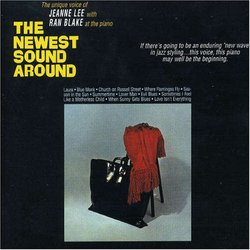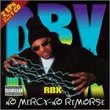| All Artists: Jeanne Lee, Ran Blake Title: Newest Sound Around Members Wishing: 1 Total Copies: 0 Label: RCA Victor Europe Release Date: 4/24/2000 Album Type: Extra tracks, Import, Original recording remastered Genres: Jazz, Special Interest, Pop Styles: Avant Garde & Free Jazz, Modern Postbebop, Bebop Number of Discs: 1 SwapaCD Credits: 1 UPC: 743217480523 |
Search - Jeanne Lee, Ran Blake :: Newest Sound Around
 | Jeanne Lee, Ran Blake Newest Sound Around Genres: Jazz, Special Interest, Pop
Liner Notes Featured in French and English, Bonus Tracks (Never Released Tracks) and Remastering from the Original Tapes in 24 Bit Technology. |
Larger Image |
CD DetailsSynopsis
Album Details Liner Notes Featured in French and English, Bonus Tracks (Never Released Tracks) and Remastering from the Original Tapes in 24 Bit Technology. Similar CDs
|
CD ReviewsAbstract and darkly passionate Ricard Giner (cootie@cootiesjazz.co | Brighton, UK | 06/03/2001 (4 out of 5 stars) "This record was a major challenge to both the traditionalists and the emerging avant-garde. Jeanne Lee was a pioneer of avant-garde singing, graced with a haunting, hypnotic voice. Ran Blake's piano explores the internal structures of harmonies with delicate colourations. The Newest Sound Around is an intriguing, strange mesh of piano and vocal sounds delivered with a passionate tenderness.The novel approach contrasts strikingly with the material: standards such as "Summertime" and "Lover Man", and traditional gospel such as "Motherless Child". But this is the great idea behind the album: new sounds will penetrate the unprepared ear more profoundly if wrought from familiar material.The album cover boldly proclaimed that this music "may well be the beginning" of "an enduring new wave in jazz styling". Well, by definition, no new wave can be enduring, nor should it be. Jeanne Lee remains one of jazz's most original, individual and compelling vocalists." Compelling and unique jazz vocal album recordmaven | northeast USA | 09/07/2005 (5 out of 5 stars) "Out of print for many years, "Newest Sound Around" is a unique interpretation of piano and vocal jazz duets. I first heard one of the best tracks on the album, "Laura," on a Smithsonian-sponsored collection of third-stream jazz, circa 1976, and it stayed with me. "Laura" was the only vocal performance in the avant-garde/third stream compilation. Fortunately, I managed to get a copy of the Smithsonian record (also long out of print) and have listened periodically to "Laura" over the years, but always wondered about the rest of "Newest Sound Around." I never did locate a copy of the LP. Now the whole CD is available! Why is this record so memorable, and why do I like it so much? 3 reasons: 1) Jeanne Lee's vocal stylings - warm and traditional while avant-garde at the same time - a rare combination of strengths; 2) Ran Blake's piano - like ice tinkling in a glass, discordant yet perfectly complimentary to the vocals. As an example, the chords of the familiar "Blue Monk" are transformed into something so different that the listener can hardly believe it's the same blues song performed so often by Monk himself; 3) The choice of repertoire - an interesting mix of styles, each of which is turned inside out and performed in a new way. If you're into traditional jazz only, this is probably not for you, but if you admire creativity and are willing to try something new, this is a great selection. If you listen carefully, you can hear traces of this album in many later recordings which it influenced. Hats off to Ran Blake, Jeanne Lee and producer George Avakian for recognizing and recording something really unique." Half a Century Later, This is Still Tomorrow's Music Gary L Connely | Hercules, CA | 07/12/2008 (5 out of 5 stars) "Recorded in 1961, "The Newest Sound Around" still is. One thing you can say for sure about singer Jeanne Lee's and pianist Ran Blake's mutual debut album is that it didn't trigger an avalanche of imitators. In his book, "Jazz: A Critic's Guide to the 100 Most Important Recordings," Ben Ratliff describes "The Newest Sound Around" as an "outsider-art work." He certainly got that right. Today, Patricia Barber is the only "main stream" artist I can think of who sometimes sounds even a little like what Ms Lee and Mr Blake were doing almost 50 years ago.
To my ears, Ms Lee has an extremely pleasing, smokey, flexible voice. There's no place in a song that she can't navigate with ease - and when she improvises, you're left thinking, "Why didn't the composer think of that?" Mr Blake can just flat play. He never shows off, but if you are one of the handful of people who have listened to his piano playing over the years, you know he's got "chops" and then some. "The Newest Sound Around" is a mix of standards, film music, a Monk tune and some originals by Mr Blake. If you're into "avant garde," "third stream," or just plain "lovely and mysterious" jazz, this album is for you. Half a century after it was recorded, it still sounds like tomorrow's music." |

 Track Listings (15) - Disc #1
Track Listings (15) - Disc #1